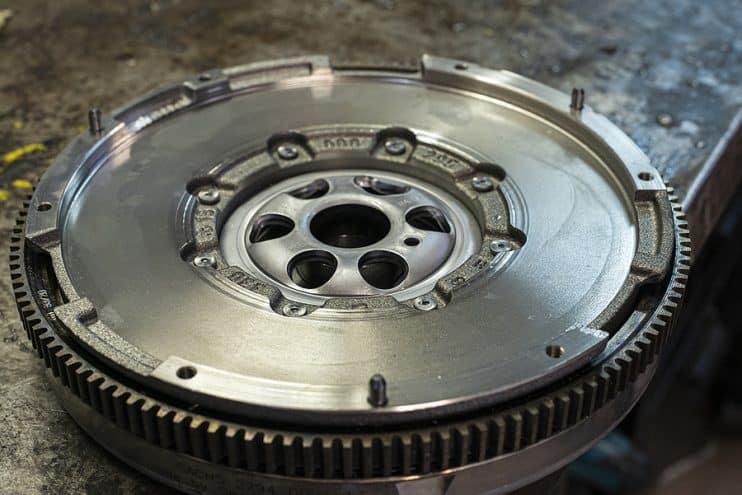
Your motor’s flywheel ensures that power from your motor is transferred smoothly, particularly during engine starting, idling and gear changes.
Bolted to the crankshaft at the rear of the engine, the flywheel stores intermittent rotational energy to boost power as needed. It also absorbs excess power, neutralises vibrations from the crankshaft and balances any fluctuations in your engine speed. The flywheel is what keeps your engine running when you take your foot off the accelerator, for example.
If there are problems with your flywheel, it’s much harder to change gears, and it’s also possible to inflict irreversible and costly damage to the clutch.
The flywheel is a large, round metal disc, usually made from cast iron, steel or aluminum. There are two types of flywheels – single mass flywheels and dual mass flywheels – with most modern manual transmission vehicles using a dual mass flywheel. The first car manufacturer to use a dual mass flywheel was BMW.
A dual mass flywheel has two flywheels that rotate independently of each other, with one attached to the clutch and one to the engine. A series of springs between the two discs absorb engine vibrations, so they don’t reach the gearbox.
So what happens when a flywheel develops a fault? We’ve got the lowdown on identifying problems and how to avoid them.
Table of contents:
Signs of a faulty flywheel
Knowing the symptoms and signs of a faulty flywheel will help you address the problem promptly with a new or used replacement flywheel, and ensure you’re safe while out on the road. Here’s what to look out for:
1. A burning smell
A burning smell from under your vehicle is a sign that your clutch isn’t working correctly or isn’t being used properly. It comes from clutch plate wear and tear, which can be caused by a warped flywheel causing too much friction and heat. The clutch will likely stop working if you don’t replace your flywheel.
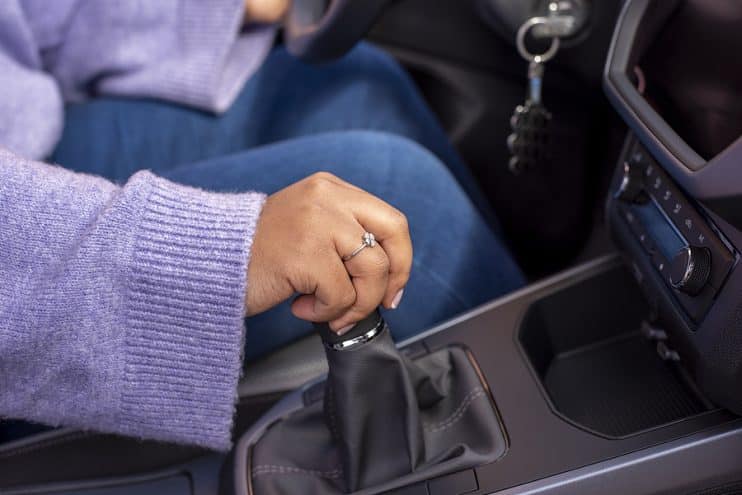
2. Difficulty changing gears
Problems changing gears is a sure sign of flywheel damage and usually signifies that it’s in terrible shape. If you can’t change gears or have difficulty doing so, you’re unlikely to be able to drive your car, so it’s time to get prompt advice from a professional.
3. Slipping gears
If you find that your engine speed increases faster than your ground speed, your gears are slipping. Slippage can be caused by your flywheel failing to engage properly with the clutch, perhaps because it is warped or glazed with oil.
Even if it’s intermittent slippage, it’s worth getting slipping gears checked out. Over time, they can do irreparable damage to your clutch.
4. A vibrating clutch pedal (clutch chatter)
If you notice vibrations coming from your clutch pedal, or even worse, from the floor of your vehicle, it’s a symptom of a failing flywheel. One of the flywheel’s purposes is to absorb vibrations, so if it’s not doing this, it will need to be replaced before it causes further damage.
5. Vibrating engine
An unbalanced flywheel can even vibrate your whole engine. Ensuring all bolts are tightened to the correct specifications is vital if you’ve replaced any part of the clutch, flywheel or pressure plate. Flywheels are heavy and store a lot of energy, so one coming loose while you’re driving can be very dangerous,
6. Clutch drag
If you find that your clutch isn’t disengaging correctly, causing hard starting, moving during starting, or even stalling in severe cases, it may be that your flywheel is warped and has caused problems with the clutch.
7. Vehicle stalling or hard start
The additional friction that flywheels provide for the clutch and the teeth around their rim that engage with the starter gets your vehicle moving from a standstill when you turn the key. If there’s a problem with your flywheel’s momentum, your vehicle’s engine speed drops too quickly when starting, causing your car to stall or have a hard time getting started.
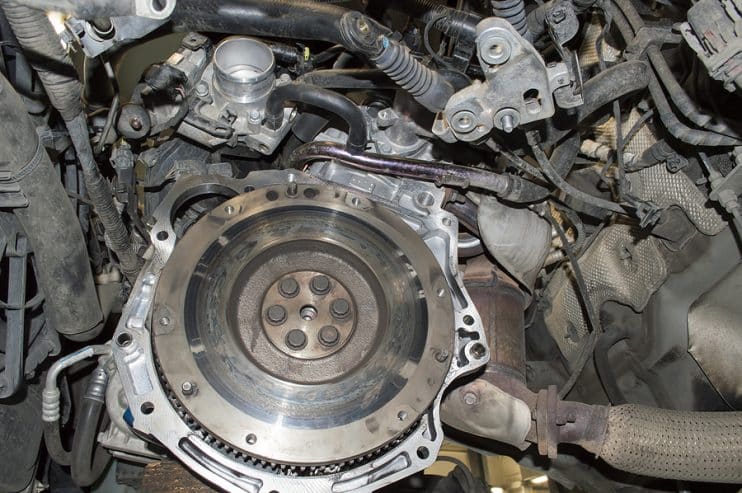
What causes damage to a flywheel?
There are three leading causes of flywheel damage:
- Improper maintenance: Ignoring issues with your clutch, no matter how small, can end up damaging your flywheel, which is a lot more expensive to replace. Ensure you torque a new clutch or starter to the correct specifications and that all components are balanced.
- Overheating: Too much heat from a slipping or defective clutch can crack or warp your flywheel.
- Bad driving habits: Riding the clutch, pulling loads that are too heavy for your vehicle, driving in the wrong gear and placing your vehicle in reverse or first gear with the engine off are all poor motoring habits that can cause damage to the flywheel.
Can you drive with a bad flywheel?
While driving with a faulty flywheel is technically possible, we wouldn’t recommend it. The vital role that your flywheel plays in smoothing out the transfer of power from your engine to your wheels means that any faults can have a significant knock-on effect elsewhere, especially within the clutch components, the crankshaft and the engine.
Even if the damage to your flywheel is minor now, the problems this can cause will lead to more severe and costly damage further down the line.
If you’re unsure whether your flywheel has an issue, it’s a good idea to take it to a trusted professional for a thorough inspection. They can let you know if you need to replace your flywheel.

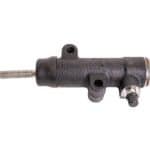
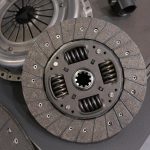
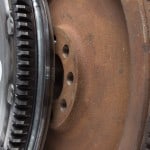
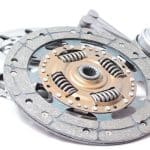
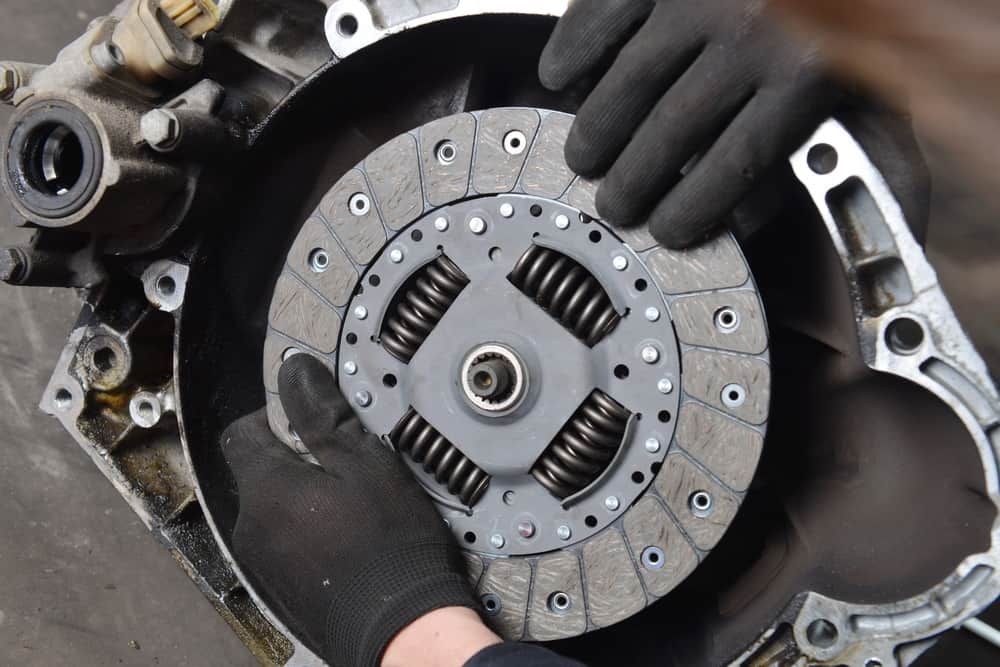
.png)